 A major challenge for drone operation in western countries is the development of legislation to enable safe and efficient operation, especially in busy urban areas where crashes, and even terrorism are a concern of officials.
A major challenge for drone operation in western countries is the development of legislation to enable safe and efficient operation, especially in busy urban areas where crashes, and even terrorism are a concern of officials.
This perhaps explains why many predict that drones will take off first of all in African countries where there is a strong demand for devices that can travel long distances without relying on often poor ground-based infrastructure. That many of these journeys take place over largely open terrain, and with little pre-existing legislation to prevent it makes the prediction logical in many ways.
Medical supplies
I’ve covered previously the use of drones to help those in disaster zones, but Zipline are hoping to do a similar thing for medical supplies to remote facilities in Rwanda.
The company is working with the government in Rwanda to supply a network of drones that can supply medical equipment throughout the country. The aim is to deliver up to 150 times each day using a fleet of approximately 15 drones.
Each drone will navigate to the site and airdrop their cargo before then flying back to base (and doing the same again).
“This visionary project in Rwanda has the potential to revolutionize public health, and its life-saving potential is vast,” the team said.
It underlines the potential for rolling out innovations in more uncharted territory and echoes comments made last year by telehealth pioneer Ali Parsa that the technology is likely to take off initially in developing countries less burdened by ‘business as usual.
It’s quite possible that drone technology will initially take flight in places like Rwanda. It will certainly be an interesting project to track.